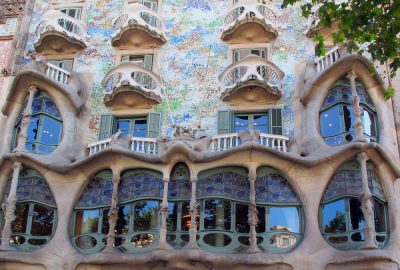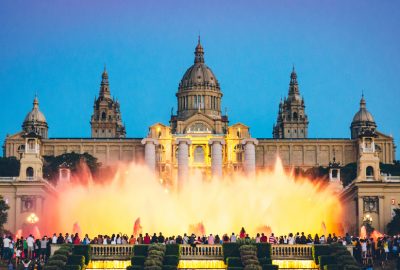Three kinds of people visit Barcelona: architecture geeks, football fans and LSD enthusiasts. Barcelona is slightly smaller than Madrid and one of the most vibrant harbours on the Mediterranean. The capital of Catalonia is a city of artists and procrastinators. Everything takes years to finish, everyone is always late and slightly pissed off. The Gothic Quarter (Barri Gòtic in Catalan) is the pulsing heartbeat of Barcelona: small, claustrophobic alleys and a huge cathedral. The Cathedral of the Holy Cross and Saint Eulalia (Catalan: Catedral de la Santa Creu i Santa Eulàlia) took three centuries to build, but it was clearly worth the effort. There’s even a Well of Geese in its courtyard; those feathered little beasts caused many tourists an injury. Getting pecked by poultry isn’t even the weirdest thing about Barcelona. That title belongs to Gaudi’s mind-bending architecture. He was a peculiar architect, perhaps more of a sculptor, some of the buildings he designed look like they were born during a heavily drug-induced trip. Colourful, distorted, even warped, those pieces of Art Nouveau are like three-dimensional Dali paintings. Take La Sagrada Familia for example, Gaudi’s magnum opus reminds me of a fractal, ever-changing, evolving, not even close to being finished. That kind of style began with Colonia Güell, a church and a crypt that the architect built for the Güell family, one of his biggest clients. Park Güell is another project he did for them, a park with corridors that remind of an inside of snake coil. Gaudi was a master architect. Casa Milà, popularly known as La Pedrera or "The stone quarry" is one of his more toned down projects. Yet it still characteristic and recognized as a UNESCO World Heritage site, like most of his work. He’s probably rolling in his grave seeing what kind of modern atrocities are being built in his beloved Barcelona.

Casa Batllo, also called Casa dels ossos (House of Bones) because of its skeletal structure, might not be a famous as Casa Mila, Park Guell or La Sagrada Familia but it is certainly one of Antoni Gaudi's masterpieces
Camp Nou is such a thing; but who cares, football is the most popular sports in the world and it sells. FC Barcelona, often referred to as Barça, is known as one of the best clubs in the world. It’s for good reasons that its motto is Més que un club (More than a club). Such an iconic club deserves a cutting-edge stadium. Just like their ball-kicking experts deserve those millions of euros annually. FC Barcelona went through some financial hard times recently though and budget cuts were inevitable. In 2021 the club had to let go of its biggest star Lionel Messi, whose latest salary was variously reported as being between €70 million and €90 million per season. The Argentinian spent his entire professional career with the Catalan club and he broke into tears when he announced his farewell on a press conference. After playing more than 20 years in Barcelona he went to Paris to sign a very lucrative contract with PSG. Barça has a long history of fantastic players, especially spectacular Latin American strikers such as Romario, Ronaldo, Ronaldinho and Suárez. But Messi will certainly be remembered as the greatest ever who played in the iconic blue and red jerseys. Well as a Dutchman, I maybe better say: together with the late legend Johan Cruijff, who didn’t have his roots in the favelas of a Latin city but a working-class district in Amsterdam. He was called El Salvador (The Saviour) and celebrated triumphs at the club in the 1970s. Ball-kickers are the new gladiators and the best ones deserve the largest arena in Europe. Camp Nou has the capacity to house almost a 100,000 fans of these modern-age gods. Many fans are willing to pay heaps of money to experience the sweaty lockers where their idols touch each other following a won battle. The illuminate of ball kicking organize tours, open shops where you can buy artefacts, such as t-shirts and scarfs and museums where you witness the history of this phenomenon. You can go wild on smelling rugged balls from ancient times and even pray in an on-site church. Strange times we live in.
Barcelona is the so-called second city of Spain, I’m not sure why because it appears to be much more popular than Madrid. But most of all: its inhabitants consider themselves as Catalans and not Spanish. The Catalan independence referendum of 2017, also known by the numeronym 1-O (for "1 October") was declared illegal and suspended by the Constitutional Court of Spain after a request from the Spanish government. The follow-up events including the arrestment of nationalistic leaders increased the tensions and the feelings of misunderstanding and the cultural gap between Spain and the autonomous region of Catalonia seem to be deeper and bigger than ever before. One thing is for sure: 2017 was a hectic and troublesome year after La Rambla (Las Ramblas), the city’s life vain, was hit by a horrible terror attack in spring of the same year. But it appears that all these troubles only gave a boost to the city’s radiant energy and joy for life. The city is compact and densely populated, its’ chaotic Art Nouveau architecture has always reminded me of an ant mound. Tourism and the number of foreigners moving to Barcelona have been steadily increasing the past few years. It has reached the point that natives have started seriously complaining about it. The mess and dirt tourists leave behind in the public area and the increasing prices of food and accommodation are a pain in the ass for many locals. Locals also say the street noise is beyond reasonable limits. When Spanish who have quite a reputation for being loud themselves start to complaint about noise, it means really something.

The Magic Fountain of Montjuic is located below the Palau Nacional on the Montjuic mountain, be sure to check the actual time tables when you want to be in time for the colourful light shows accompanied by music
One thing is for sure: Barcelona a happening place you will not easily have a dull moment. An ex-girlfriend of mine used to live with her friends in Barcelona during her student exchange days. She claims those days were the best times of her life and Barcelona the best city she ever visited. After her return she never stopped telling funny memoires from her time in Barcelona. Her stories included drinking wine and stealing underwear from random people’s hanged laundry in the middle of the night. And there was also an anecdote about a guy that fell from a second-floor balcony, right next to their table, when they were having their morning coffee in one of the cafés. But I don’t remember that one so well so don’t quote me on that. From beautiful beaches and stealing panties to world-class football and museums dedicated to Picasso and Miró: everyone will find someone they enjoy doing in Barcelona. What I enjoy the most in Barcelona is strolling in Barri Gòtic, with its tiny streets full of laundry hanging over balconies where the sun will not come through. Usually I will end up in a basement bar on a quiet square (my personal favourite is the one next to Basilica of Santa Maria del Mar), where I will order a big plate of wonderful Bask tapas and lovely local wine or chilled beer on the side.



No one commented yet. Be the first.